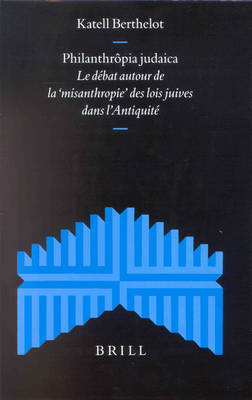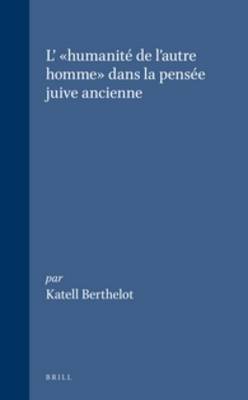Supplements to the Journal for the Study of Judaism
2 primary works
Book 76
This volume deals with the accusations of misanthropy directed against the Jews during the Hellenistic and Roman period, and with the Jewish attempts to answer those charges.
The first part of the book examines the different meanings of the words philanthropia, misanthropia, apanthropia, philoxenia and misoxenia, and analyses the relevant Greek, Egyptian and Roman sources, in order to clarify the significance of the accusation of misanthropy for each writer.
The second part deals with the Jewish answers to these accusations, especially with Philo's and Josephus' attempts to show the humane character of the Mosaic Law.
This book is the first attempt to write a comprehensive history of this type of anti-Jewish discourse in Antiquity and of the Jewish reactions it provoked.
The first part of the book examines the different meanings of the words philanthropia, misanthropia, apanthropia, philoxenia and misoxenia, and analyses the relevant Greek, Egyptian and Roman sources, in order to clarify the significance of the accusation of misanthropy for each writer.
The second part deals with the Jewish answers to these accusations, especially with Philo's and Josephus' attempts to show the humane character of the Mosaic Law.
This book is the first attempt to write a comprehensive history of this type of anti-Jewish discourse in Antiquity and of the Jewish reactions it provoked.
Book 87
L' "humanite de l'autre homme" dans la pensee juive ancienne
by Katell Berthelot
Published 12 March 2004
This book analyzes how humanism was conceived of in different philosophical schools during the Hellenistic and early Roman period, and how these ideas were debated in ancient Jewish thought. The term humanism refers to the idea that every person has duties towards his/her fellow human beings, for the sole reason that they all share a common nature or are bound by a form of kinship.
The book also tries to determine to which extent Gen 1:26-27 (creation of human beings in God's image) and Lev 19:18 (the commandment to love one's neighbour, who is like oneself) could be interpreted in a humanistic way by ancient Jewish writers.
The book also tries to determine to which extent Gen 1:26-27 (creation of human beings in God's image) and Lev 19:18 (the commandment to love one's neighbour, who is like oneself) could be interpreted in a humanistic way by ancient Jewish writers.

